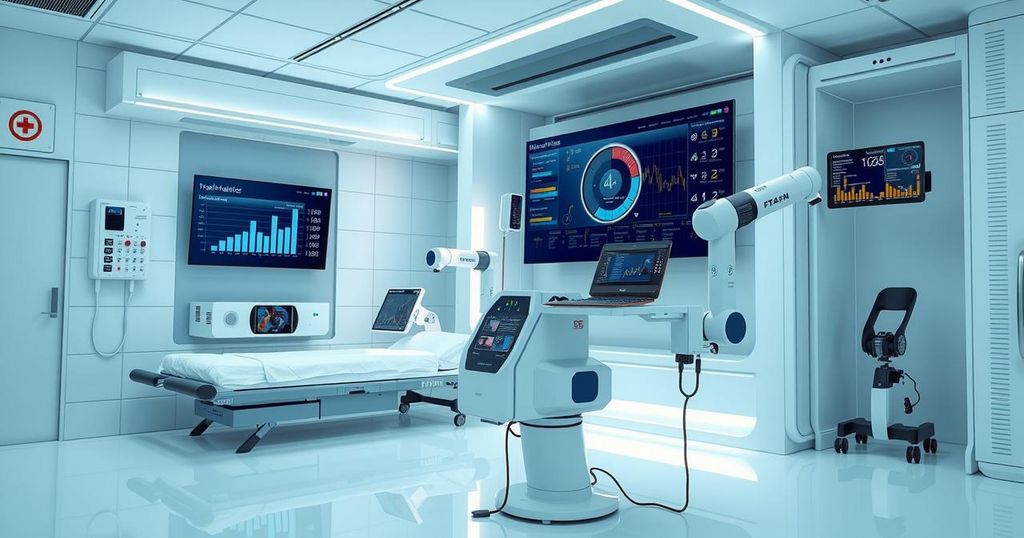Harnessing AI in Healthcare: A Framework for Integration and Success
Artificial intelligence is revolutionizing healthcare with improved diagnostics, patient monitoring, and enhanced workflows, as explored by Vijaya Kumar Guntumadugu. His framework addresses successful AI integration, highlighting the impact on clinical decision-making, administrative efficiencies, and security concerns. The increasing adoption of AI elegantly promises more effective and responsive healthcare services, while methods to overcome implementation challenges will ensure a brighter future in patient care.
The landscape of healthcare is undergoing a transformative shift thanks to artificial intelligence (AI). This technology enhances diagnostics, patient monitoring, and optimizes workflows, as explored by Vijaya Kumar Guntumadugu. His research systematically addresses the key components for effectively integrating AI in healthcare, covering decision support, predictive modeling, and implementation challenges in real-world scenarios.
The demand for efficient healthcare drives the surge in AI adoption. Traditional medical procedures often yield delays and escalated costs. AI diagnostic tools are making waves by achieving nearly 95% accuracy in medical imaging, surpassing human abilities in identifying conditions like retinopathy and melanoma. Moreover, remote patient monitoring powered by AI has significantly improved chronic disease management, with healthcare organizations seeing a remarkable 40% drop in emergency hospitalizations.
AI also revolutionizes clinical decision-making by analyzing extensive data sets, helping physicians in planning treatments, assessing risks, and predicting diseases. These systems can assess patient histories with impressive 88% accuracy, pinpointing high-risk cases effectively. This feature is especially vital in critical settings such as ICUs, where early intervention for conditions like sepsis can be life-saving.
However, challenges persist in the implementation of AI technologies. Many healthcare organizations face difficulties with integrating AI into existing electronic health records (EHRs) and management systems. Hesitancy stems from AI’s perceived opacity, often termed the ‘black box’ phenomenon. Guntumadugu advocates for stakeholder engagement and comprehensive action plans to navigate these hurdles, suggesting phased implementation and continuous training to ensure alignment with clinical practices.
AI’s role in patient monitoring is rapidly expanding. Wearable devices are now equipped to collect real-time health data and provide insights for timely interventions. Research indicates a 30% increase in medication adherence among chronic disease patients using AI-enhanced monitoring. Additionally, AI tools in hospital systems can predict patient declines, reducing ICU stays by an impressive 20%.
Beyond clinical applications, AI enhances administrative efficiencies too. Automating documentation through natural language processing (NLP) can cut down physician paperwork significantly by 50%, while also streamlining scheduling and resource management to minimize patient waiting times. AI identifies workflow inefficiencies, optimizing costs in hospital supply chains by ensuring the right resources are available when necessary.
With the rise of AI in healthcare, data security and ethical considerations remain paramount. It’s imperative for AI systems to comply with regulations like HIPAA and GDPR to protect patient data. Implementing solid encryption and access protocols is crucial to safeguard sensitive information. Additionally, addressing AI bias is essential to ensure equitable patient outcomes, necessitating diverse training datasets and the use of explainable AI (XAI) methods.
Looking ahead, AI advancements will likely incorporate edge computing and federated learning, enhancing real-time data processing and maintaining data privacy while improving AI model robustness. The potential of quantum computing for drug discovery and genomic studies could revolutionize personalized medicine, further solidifying AI’s place in healthcare.
In summary, artificial intelligence is ushering in a new era in healthcare, markedly improving diagnostics, patient care, and operational efficiencies. While challenges like interoperability and ethical concerns linger, structured frameworks like Guntumadugu’s underlie the pathway to successful AI integration. As technology progresses, it will undeniably foster a more intelligent, efficient, and responsive healthcare system.
Artificial intelligence is fundamentally transforming healthcare by significantly enhancing diagnostics, patient monitoring, and operational efficiency. Despite facing challenges such as interoperability and ethical concerns, strategies outlined by experts like Vijaya Kumar Guntumadugu provide a clear map for effective AI integration. As AI technology further evolves, its role in healthcare will continue to expand, resulting in improved patient outcomes and reduced costs, ultimately leading toward a smarter healthcare ecosystem.
Original Source: www.analyticsinsight.net




Post Comment